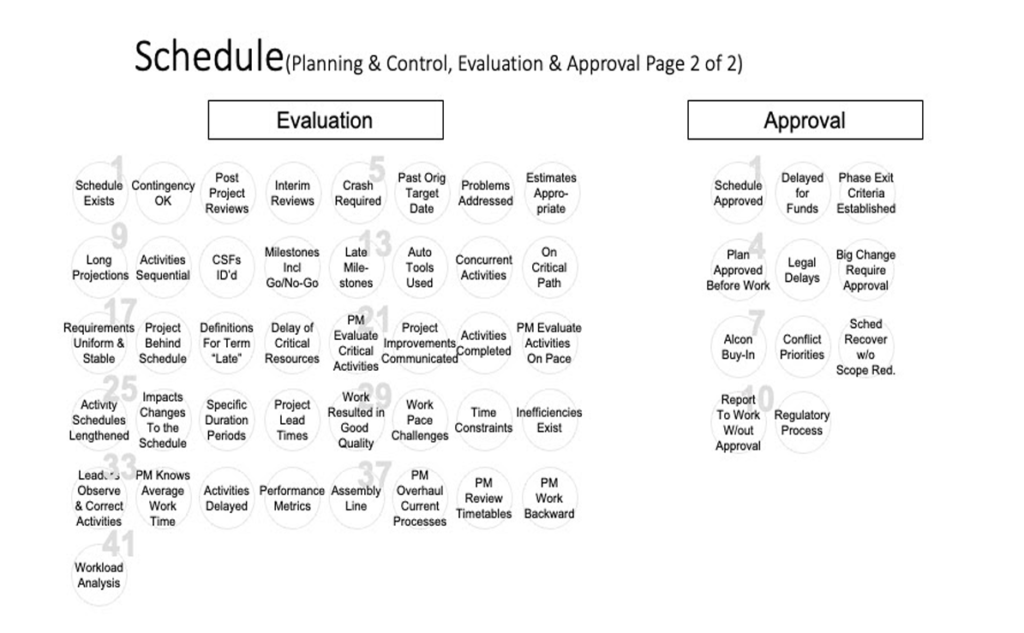
EVALUATION:
1 – Does a project schedule even exist? Does is cover (e.g., build, test, upgrade, etc)?
2 – Is the contingency sufficient for this project now and in the future?
3 – Are post project reviews conducted to determine lessons learned?
4 – Are interim reviews conducted?
5 – Was/ is a schedule crash required to get back on schedule?
6 – Is project past original scheduled date?
7 – Are scheduling problems addressed?
8 – Do time estimates appear to be appropriate?
9 – Are there any long projections being made? (Leads to poor estimates).
10 – Are activities scheduled to run sequentially in some sort of logical order?
11 – Have Critical Success Factors been identified?
12 – Do major milestones include go/ no-go decision analyses?
13 – Are any milestones late or projected to be late?
14 – Are/ were any automated tools used?
15 – Are activities scheduled to run concurrently to the maximum extent necessary?
16 – Are key activities listed on the critical path? Are they monitored
17 – Are requirements uniform and stable?
18 – If project is behind schedule, does PM know the estimated time to get it back on track? No = bad)
19 – Does PM have a definitions for the terms “late” “completed”?
20 – Can/ has a delay of critical resources or activities completion create downstream delays, such as budget and timeline? (Yes = bad)
21 – Does PM evaluate single, important, critical activities over various periods of time to determine their average, longest and shortest completion times? (Yes = good)
22 – Are project improvements communicated back to the responsible organizations? (Yes = good)
23 – Can some activities be completed during non-traditional periods (e.g., nights, weekends)
24 – Does PM evaluate any activities that are on pace to finish earlier than planned? (Yes = good)
25 – Can any activity schedule(s) be lengthened/ spread out to better manage deadlines/ costs? (Yes = blue)
26 – Can PM/ team identify the potential impacts associated with changes to the schedule? (No = red)
27 – Do all activities on the project plan/ schedule have specific duration periods? (No = bad)
28 – Are all project lead times ok? (No = blue)
29 – Has the fast/ slow pace of the work resulted in good quality?
30 – Is the work pace facing near-term challenges such as timing or seasonal weather?
31 – Is the project subjected to severe time constraints? (Yes = blue)
32 – Do inefficiencies exist that cause activities to be significantly delayed before the start? (Yes = red)
33 – Do leaders observe and correct activities to prevent unnecessary delays? (No = bad)
34 – Does PM/ activity managers knows the average amount of hours of work time performed on each task? Does s/he know how the rest of the work time is spent (e.g., before the task is done? after the task is done?)
35 – Does PM monitor how often activities get delayed while waiting for other activities to be completed? (No = bad)
36 – (After PM’s replanning effort) Are activities/ performance metrics running on-time/ faster with fewer/ less delays/ downtime? (Yes = good)
37 – When diagrammed, does project’s planned workload operate like an assembly line or something that can be easily explained? (Yes = good)
38 – Does PM see the need to overhaul any current processes, which are clearly not working, by “clean-sheeting” (defined as dismantling, simplifying, and recreating/ reassembling schedules procurement and processes? (No = blue)
39 – Does PM review timetables/ estimated times to perform/ complete activities/ tasks? (Yes = good)
40 – Does PM work backward through existing schedules to piece together new, more effective schedules? (Yes = good)
41 – Does PM conduct workload analysis to determine the number of hours/ weeks (eg. 24/7) worked within her/ his project and compare that performance against similar projects?
———————————–
APPROVAL:
1 – An official schedule was approved and distributed?
2 – Schedule was delayed due to lack of funds?
3 – Was is a phase exit criteria established?
4 – Plan was approved before work ever began?
5 – Did legal delays hamper the schedule?
6 – Do did big changes to the project schedule require approval?
7 – Do all concerned (alcon) buy-in and support this schedule?
8 – Were/ are there any conflicting priorities on this project?
9 – Is schedule recovery being attempted without a scope reduction?
10 – Are “on-call workers” reporting to work without prior approval? (Yes = bad)
11 – (Especially for construction projects) Does PM understand the regulatory process and the estimated durations for:
*Application
*Inspection
*Permitting
*Approval
